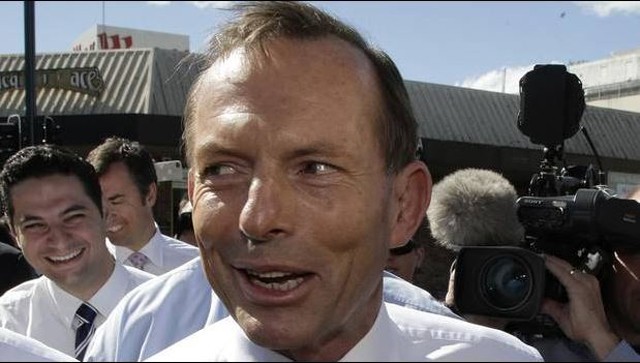G’day, Australia. Canada here. We’ve been following your federal election, and we need to talk.
Until last weekend’s leaders’ debate, when Prime Minister Kevin Rudd announced that, if returned to office, his Labor government would seek to legalize same-sex marriage, most of us up here had little idea just how mired you lot were in the past.
We’re similar countries, you and we, linked by language and parliamentary tradition and a certain old English lady on our banknotes.
You’ll forgive us for finding it hard to believe that a question of basic legal equality, long since settled here, is still up for mainstream debate in your politics.
Yet there it was.
“I’m not someone who wants to see radical change based on the fashion of the moment,” opposition Leader Tony Abbott told a Sydney radio host last Wednesday.
His comments immediately came under fire from Labor politicians, but Mr. Abbott’s reply has been a familiar dodge: marriage equality, he says, is just a distraction from the “bread-and-butter issues” that would preoccupy his government.
“The priority will be on things like reducing cost-of-living pressure and increasing job security,” he said during the debate last weekend.
You should know, friends, that this argument is about as original as it is compelling.
The idea that you, or we, or anyone else should be willing to tolerate entrenched legal inequality because of the economy is, quite frankly, inane.
At the heart of Mr. Abbott’s spin lies a false choice, between “bread-and-butter issues” on one hand and “the fashion of the moment” – that is, marriage equality – on the other.
But progress and prosperity have never been mutually exclusive; any competent government can steer the great bus of state without making certain citizens sit at the back.
Abbott’s tactic has been to portray the status quo as static, and the choice as between the comfortable complacency of “tradition” and the uncertain churn of “radical change.”
This, too, is false framing.
Acquiescence in inequality is not inaction; it’s an affirmative choice to abide injustice.
For Australians, as for Canadians nearly a decade ago, the decision isn’t truly between change and stasis – either you’ll decide to include all citizens in the civil institution of marriage, or else you’ll decide to exclude gay Australians from the same.
Tony Abbott, like conservatives elsewhere, has sought to present the question as a highway off-ramp, rather than as a fork in the road, but he’s wrong.
The issue isn’t whether or not Australia should redefine marriage, it’s whether marriage, like any other legal privilege, should be open to everyone, regardless of sexual orientation.
When conservatives – in Canada, the United States, Australia, and anywhere else – defend “traditional” marriage as some kind of easy default option, they forget a simple truth: when “tradition” entails inequality, it’s only ever a clumsy disguise for intolerance.
Still, say we accept Tony Abbott’s position at face value.
Even if there is a choice to be made between marriage equality and, in his words, “reducing cost-of-living pressure and increasing job security,” then how on earth could any un-bigoted society possibly choose the latter?
If there is a hierarchy of legislative priorities, then equality before the law belongs at its top.
The alternative is to tell same-sex couples to take a number – we’ll all be equal just as soon as we can afford it.
The problem, of course, is that Abbott’s argument will resonate.
It still does in Canada, where same-sex marriage has been the law since 2005, and it certainly does in the United States, where the equal protection of the law has always been easier said than done.
In every Western country, gay and gay-friendly conservatives tell themselves that their comrades will eventually come around, that it’s only a matter of time before their fellow partisans finally agree that gays ought to have the same rights as everyone else.
We agree on the economy and on the size and role of government, they reassure themselves.
Why should a little benign bigotry tip the balance?
But can you imagine if the issue weren’t equality for gays, but for blacks or Jews?
It wasn’t so long ago that partisans made the same excuses for such discrimination, and anyone with a shred of moral dignity looks back on that history with abhorrence.
Why are gays different?
Because it’s only a matter of time, some say.
Their political bedfellows obviously beg to differ – would discrimination’s defenders really spend so much time and treasure if their defeat were so certain?
In the meantime, conservatives who support marriage equality but bite their tongues are complicit in one of recent history’s most galling self-fulfilling prophecies.
By voting with their pocketbooks instead of their consciences, they are helping to delay equality and deny justice to their friends, neighbours, and fellow citizens.
If those truly are their priorities, then they ought to be impossible to defend.
So, Australia, your leaders have offered you a straightforward choice in this election, between equality or its absence.
Sure, Labor and the Coalition offer different economic programs, but the dissimilarities between them are nowhere near as stark as between the parties’ positions on marriage: one favours equality, the other favours discrimination.
Rarely in politics does one find quite so clear a binary.
Don’t let us down.
Adam Goldenberg is a Kirby Simon Human Rights Fellow at Yale Law School and a contributor to CBC News: The National . He tweets at @adamgoldenberg.
Photo: Rob Griffith
Author: Adam Goldenberg
Publication: The Globe and Mail
Date: 20 August 2013

